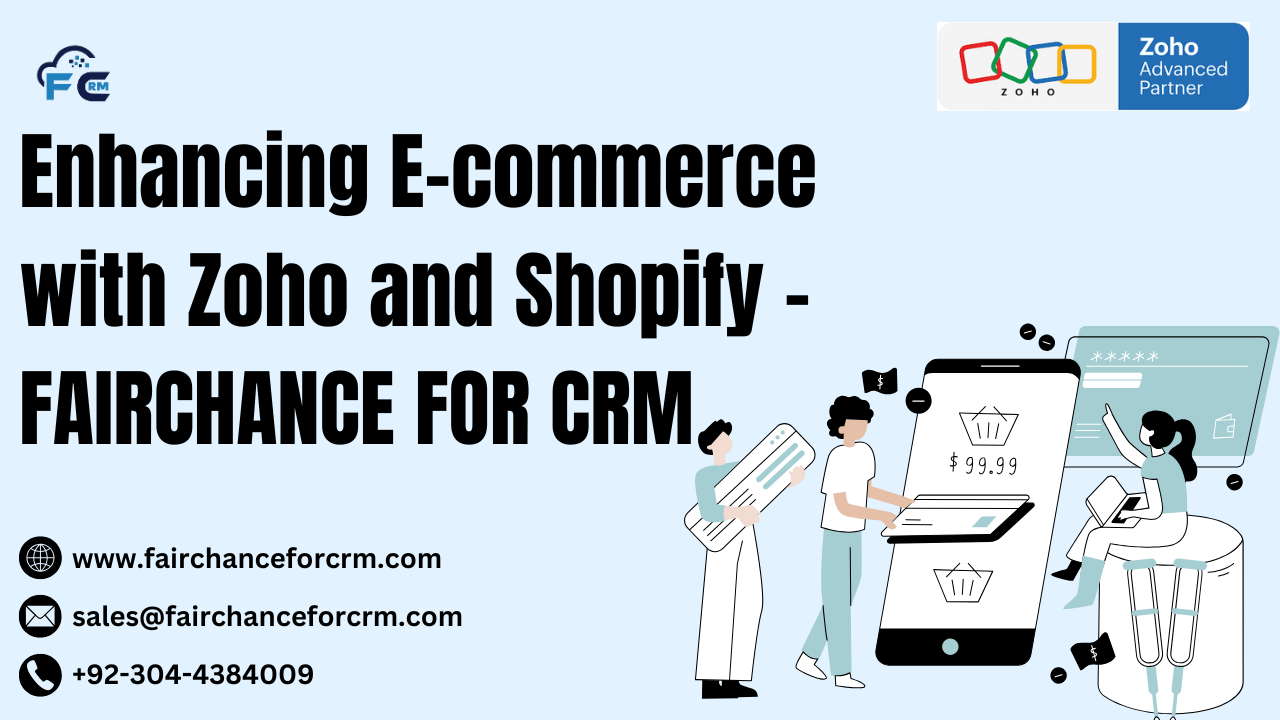Enhancing E-commerce with Zoho and Shopify is today our topic. Businesses are turning to potent technologies that may streamline their operations as a result of the growing complexity of managing online stores and the rising needs of online shoppers. Two standout platforms that have gained immense popularity are Zoho and Shopify. Even though they each have excellent standalone features, combining them produces a powerful synergy that can advance your e-commerce business. This post will examine how integrating Shopify with Zoho can revolutionize your company by improving productivity and optimizing workflows.
Also Read Related articles:
- 7 Reasons Zoho CRM is the Best Choice for E-Commerce
- Ecommerce Operations 101: Essentials of Running a Profitable Online Store
- The Ultimate Guide to Ecommerce Marketing | FAIRCHANCE FOR CRM
- 9 Challenges for Ecommerce Businesses and How to Improve
- Automated Email Campaigns in Zoho CRM for E-Commerce Business
The Benefits of Integrating Enhancing E-commerce with Zoho and Shopify
What is Zoho Shopify Integration?
Zoho Shopify Integration is the seamless connection between Zoho’s suite of business applications and the Shopify e-commerce platform. With the help of this potent mix, businesses can effectively manage every facet of their online stores, from sales tracking and marketing automation to inventory control and customer relations.
Why Integrate Zoho and Shopify?
Both Zoho and Shopify are leaders in their respective fields. A wide range of business apps, such as accounting, email marketing, CRM, and more, are available from Zoho. With over a million users, Shopify is among the most reliable e-commerce platforms globally. When integrated, these technologies provide a one-stop shop for optimizing corporate processes and raising your online store’s efficiency and earnings.
Enhancing E-commerce with Zoho and Shopify
There are several advantages to the Zoho and Shopify integration, especially in terms of improving the efficiency and streamlining of e-commerce management. Here are a few salient points where this integration excels.
1. Centralized Customer Data Management
One of the core advantages of the Zoho-Shopify integration is that it consolidates customer data from both platforms into a single, centralized system. You’ll have access to everything—purchase history, contact details, customer preferences—in one place. This unified customer database allows for personalized interactions, helping you design targeted marketing campaigns and offer tailored customer experiences. Ultimately, having all your customer data in one location helps build stronger, long-lasting relationships.
2. Optimized Inventory Management
Effective inventory management is crucial to e-commerce success, and the Zoho-Shopify integration makes it easier to maintain real-time accuracy. In order to maintain your inventory levels current and prevent overselling or stock outs, the systems communicate constantly. It is also possible to set up automated warnings for low stock levels, which facilitates timely item replenishment. You can make sure that your consumers have a positive experience and steer clear of expensive errors by having precise inventory information.
3. Marketing Automation and Personalization
Zoho’s advanced marketing tools, combined with Shopify, empower businesses to take their marketing efforts to the next level. You may automate marketing processes like customer segmentation, email campaigns, and follow-ups using this integration. Your marketing campaigns become more successful and efficient by lowering manual labor and raising personalization, which raises consumer engagement and conversion rates.
4. Streamlined Order Fulfillment
Your e-commerce business’s ability to fulfill orders may make or break it, and this integration makes it easier. Order flow automation between Shopify and Zoho enhances accuracy, expedites processing, and lowers human error. Higher customer satisfaction will result from providing accurate delivery estimates and real-time shipment tracking.
5. Advanced Analytics and Reporting
Shopify and Zoho are both excellent at offering comprehensive analytics; when they work together, they provide even more insightful data. Comprehensive reports on consumer behavior, sales trends, and website performance are all generated by you. You may use these data to better target your marketing efforts, make well-informed decisions, and modify your product line to better satisfy consumer demand.
Enhancing E-commerce with Zoho and Shopify: A Step-by-Step Guide
If you’re ready to integrate Zoho and Shopify, here’s a simple guide to get started:
- Create a Zoho Account You must create a Zoho account that meets your company’s requirements if you don’t already have one. A range of pricing options are available from Zoho for companies of all sizes.
- Connect Zoho to Your Shopify Store Log in to your Zoho account, navigate to the “App Integrations” section, and search for Shopify. Once found, select it and follow the prompts to connect your Shopify store to Zoho.
- Grant Permissions During the setup process, you’ll be asked to grant permissions for data sharing between Zoho and Shopify. This is essential for seamless data synchronization.
- Configure Settings Take some time to configure the integration according to your business needs:
- Product Mapping: Ensure that products are correctly matched between Zoho and Shopify to maintain data accuracy.
- Automate Workflows: Set up automated workflows to streamline tasks like inventory updates, customer data transfers, and order processing.
- Data Sync Frequency: Decide how often data should be synchronized between Zoho and Shopify, whether in real-time or at specific intervals.
- Test the Integration Once everything is set up, conduct thorough testing to ensure all data is syncing correctly. Test order processing, inventory updates, and customer data flow to make sure everything works smoothly.
Monitor and Optimize Continuously monitor the integration’s performance and make adjustments as needed. As your business grows, you may need to scale the integration to accommodate higher transaction volumes and additional workflows.
Conclusion
Success in the cutthroat world of e-commerce depends on productivity and client happiness. Enhancing E-commerce with Zoho and Shopify results in a potent solution that can completely change the way you operate your online store. Through order fulfillment optimization, inventory and marketing process automation, and centralization of customer data, this connection gives you the tools you need to expand your business and optimize your operations. Whether you’re running a small shop or managing a large online enterprise, Zoho Shopify Integration can help you take your e-commerce game to new heights.
For more information about the Enhancing E-commerce with Zoho and Shopify, visit this link.
If you want to Free Trail Zoho, click on this link.




